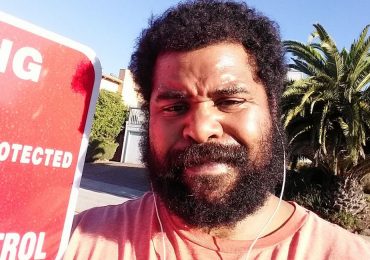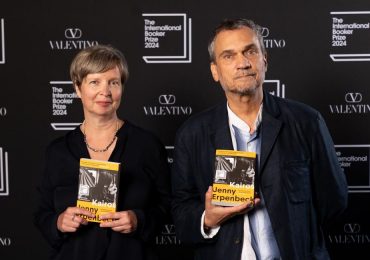The poet Angifi Proctor Dladla has died, at the age of sixty-nine.
The news was confirmed by Dladla’s family on Facebook:
Goodmorning to all Angifi Dladla’s followers and friends,we are the Dladla family and we type this message with a heavy heart.We regret to inform you that Angifi Dladla has sadly passed on, we shall keep updating on his wall regarding funeral arrangements and soforth.
Posted by Angifi Dladla on Saturday, 17 October 2020
kind regards
Umndeni wakwaDladla
Header image: Angifi Dladla takes centre stage at Poetry Africa 2007, photographed by The JRB Photo Editor Victor Dlamini.
Dladla was a poet, playwright and creative writing teacher, who wrote in English and isZulu. During his life he published two poetry collections in English, The Girl Who Then Feared to Sleep (Deep South, 2001) and Lament for Kofifi Macu (Deep South, 2017), and a book of poems in isiZulu titled Uhambo.
In an article for Poetry International, Kelwyn Sole writes that Dladla’s debut collection:
‘… received widespread praise from critics, who variously speak of its wide range of styles, voices and themes, its raw power and experimental freshness, and its heartfelt response to a society in which racism, violence and the misuse of power are still endemic. Here is a poet who requires us to look at compelling events and issues from which our first instinct has been to turn away.’
Dladla was also the author of eight plays: Mene Tekel, Mistress Magumbo, Dennis the Goat on Trial, Saragorah, The Mirror, Kgodumodumo (2003), The Clique of the Rastafarian (2010) and Comrade Sgemza (2014), and the co-author of a number of others. Dladla was known to have been working on two poetry manuscripts, ‘We Are All Rivers’ and ‘Maxwell the Gorilla and the Archbishop of Soshanguve’, but was inclined to prioritise his community work and teaching ahead of his own writing.
Dladla was born on 24 November 1950 in Thaka township in the then-Transvaal, and spent much of his life based in Katlehong. He began writing poetry and plays while at St Chad’s High School in Ladysmith, where his plays were performed by his fellow students.
During the State of Emergency in the nineteen-eighties Dladla went by the names Muntu wa Bachaki or Udibi Lwase Sandlwana to elude the authorities, and was a strong believer in poetry as activism.
‘As a poet I will always continue sharing my humanity and empathic voice with the world. The country’s stark economic imbalance together with a sense of forgetfulness and insensitivity in South Africa awakens the poet in me.’
—from an interview with Tom Penfold, Journal of the African Literature Association, 2018
Together with writers such as Mxolisi Nyezwa, Seitlhamo Motsapi and Lesego Rampolokeng, Dladla was considered part of what Tom Penfold calls ‘The Poets of No Sure Place’, a post-transition generation of poets ‘who attack the current government and paint a hostile alternative picture of South Africa’ and reflect the idea that the ‘hopes of a utopian Rainbow Nation have died and been replaced by disillusion and uncertainty’.
In a 2018 interview with Penfold for the Journal of the African Literature Association, Dladla said he believed that ‘a poet is the conscience and pulse of his or her people’. He told Penfold:
‘Our people are angry. In Afrikaans they are gatvol or very fed up. This is demonstrated by daily service delivery protests. As expected, the police respond with overkill. The poet as a responsible citizen cannot be neutral and soft while the politicians are increasingly binge eating and hoarding more than they need amid dire poverty.’
Sole calls Dladla a ‘convinced Pan-Africanist’, inspired in his work by a wide variety of writers, including Es’kia Mphahlele, Arthur Nortje, Mazisi Kunene, Keoropetse Kgositsile and the isiZulu-language poet and playwright DBZ Ntuli, as well as more far-reaching influences such as Léopold Sédar Senghor and Okot p’Bitek, the Angolan poet António Jacinto and ancient Egyptian poetry.
In the interview with Penfold, Dladla said of his own work:
‘The truth is that when I write I don’t think about an audience, I’m just carried away by the subject and the creative act. It is only after writing when I realise that the work is directed to the lovers of poetry, to the peoples of the world, to those interested in the “new” South Africa, to Blacks all over the world.’
And Dladla’s work was undeniably powerful. Sole writes:
‘Perhaps most strikingly, Dladla is the master of the concise, surreally tinted but devastating image of the real; who can forget the corpse in the street after necklacing in the poem “Impression” that resembles “human gravy in the sun”? Or the “red / shoe on the railway” that “licks shuddering wounds and / wails like a cheated / coffin” (“Vacancy”); or the Zionist church baptisms in “The Intangible” whose members take “rhetorical dives and blobs / in the watery realm / in search of a vocal mirage / which becomes an echo / the nearer they advance.”’
Dladla was a leading figure in community development and social work. Since the late nineteen-eighties, he had been the director of the Community Life Network, a non-profit organisation based in the East Rand, which ran projects such as the Akudlalwa Communal Theatre, the Femba Writing Project, the Afrika Reads Forum and Chakida Publishers. In 2004, following a series of creative writing workshops, Dladla edited and published a multilingual anthology titled Wa lala, Wa sala (‘You snooze, You lose’), containing the work of students, members of the Afrika Reads Forum, as well as inmates from Boksburg Correctional Services. The book was published by Chakida Publishers. In 2009 he edited and published Reaching Out: Voices from Groenpunt Maximum-Security Prison (Chakida Publishers), a collection of poems, short stories, interviews and prose by ten men serving sentences at the prison.
Dladla’s own poetry was published widely in South Africa and internationally, including in Tribute magazine, New Contrast, New Coin—where he developed a productive relationship with poet and editor Robert Berold—and recently in the Johannesburg Review of Books.
When asked by Penfold: ‘If there was one take-away message or idea you hoped Lament or your poetry as a whole would offer those who read it, what would you want that to be?’, Dladla replied:
‘How to be a better human being.’
Read a fitting excerpt from one of Dladla’s poems published in The JRB, ‘PHRRR’:
No distance, no circumstance will replace
you. We meet, oh we meet in the now
through thoughts and dreams.Love is a crocodile, dear one,
fasting, fasting.
The JRB extends condolences to Dladla’s friends and family.






excellent and also impressive blog. I actually wish to thank you, for giving us better details.